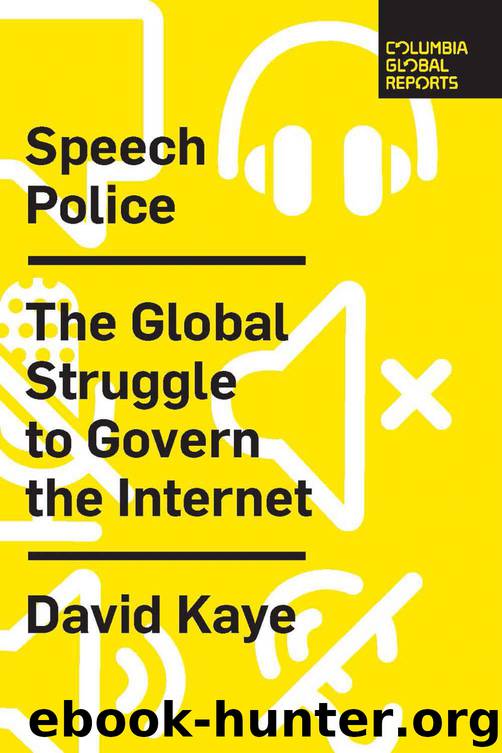Speech Police by Kaye David

Author:Kaye, David [Kaye, David]
Language: eng
Format: azw3
Publisher: Columbia Global Reports
Published: 2019-06-02T16:00:00+00:00
Across the Channel in Brussels, one European Commission official told me in the summer of 2018, “Terrorism content is not a problem. The companies deal with it, often within an hour, and hashtagging is the way forward.” I wondered about that, because at the same time, Commission officials were preparing to increase the pressure on the platforms to take down what they describe as terrorist content.
In fact, companies have developed AI technologies to enable the removal of terrorist content within the hour of upload. Reposted terrorist content, once it is in a specified “hash database” accessible to all the companies, may be deleted or blocked within moments of attempted upload. Companies have taken these steps under public, economic, and political pressure. Company definitions of terrorism, in their content rules, were broad enough to encompass anything that governments might demand.
Still, European governments continue to express dissatisfaction with company behavior and the reach of European law to impose responsibilities on them. In September 2018, after a protracted debate among Commissioners, the Commission proposed to move beyond the soft law of voluntary commitments. Vĕra Jourová argued that “we should have absolute certainty that all the platforms and all the IT providers will delete the terrorist content and will cooperate with the law enforcement bodies in all the member states.”
“Absolute certainty” is fantasy. With the bar placed that high, governments are setting up the companies to bear political responsibility for any future terrorist attacks. They will be blamed by governments because they did not catch terrorist content or take it down fast enough. This is liability-plus—the hard reality of financial sanctions to be threatened on the companies plus the political reality that there is no easier scapegoat for a European official than the American companies that host so much of the public discourse in Europe. The companies are playing along, talking up their use of AI and hashing to remove terrorist content, because they do not have much of a choice.
In the fall of 2018, the Commission proposed a regulation that would expand the responsibilities of companies to take down material said to incite terrorist acts and to actively monitor user-generated content on their platforms. But instead of involving public authorities—courts or other independent agencies—to determine when an act aims to incite or “glorify” terrorism, it asks that companies make that determination for each of the twenty-eight member states of the European Union. Its breadth and vagueness are problematic. This is not like child sexual abuse, for which there is a consensus around imagery that clearly and objectively meets a concrete definition. Rather, it is asking companies to make legal decisions, and fine ones at that, about what constitutes the elements of terrorism, of incitement to terrorism, of the glorification of terrorism. Companies are policing content that meets these criteria, rather than the usual institutions of democratic governance.
Download
This site does not store any files on its server. We only index and link to content provided by other sites. Please contact the content providers to delete copyright contents if any and email us, we'll remove relevant links or contents immediately.
| Blogging & Blogs | eBay |
| E-Commerce | Hacking |
| Online Searching | Podcasts & Webcasts |
| Search Engine Optimization | Social Media |
| Social Media for Business | Web Browsers |
| Web Marketing |
Secrets of the JavaScript Ninja by John Resig Bear Bibeault(19602)
Kotlin in Action by Dmitry Jemerov(18632)
Grails in Action by Glen Smith Peter Ledbrook(16314)
Sass and Compass in Action by Wynn Netherland Nathan Weizenbaum Chris Eppstein Brandon Mathis(13940)
WordPress Plugin Development Cookbook by Yannick Lefebvre(4403)
Ember.js in Action by Joachim Haagen Skeie(3951)
Mastering Azure Security by Mustafa Toroman and Tom Janetscheck(3528)
Learning React: Functional Web Development with React and Redux by Banks Alex & Porcello Eve(3177)
A Blueprint for Production-Ready Web Applications: Leverage industry best practices to create complete web apps with Python, TypeScript, and AWS by Dr. Philip Jones(3120)
The Innovators: How a Group of Hackers, Geniuses, and Geeks Created the Digital Revolution by Walter Isaacson(3102)
Mastering Bitcoin: Programming the Open Blockchain by Andreas M. Antonopoulos(3029)
The Art Of Deception by Kevin Mitnick(2782)
Drugs Unlimited by Mike Power(2579)
Hands-On Cybersecurity with Blockchain by Rajneesh Gupta(2455)
Kali Linux - An Ethical Hacker's Cookbook: End-to-end penetration testing solutions by Sharma Himanshu(2376)
Writing for the Web: Creating Compelling Web Content Using Words, Pictures and Sound (Eva Spring's Library) by Lynda Felder(2335)
SEO 2018: Learn search engine optimization with smart internet marketing strategies by Adam Clarke(2251)
JavaScript by Example by S Dani Akash(2217)
DarkMarket by Misha Glenny(2200)
